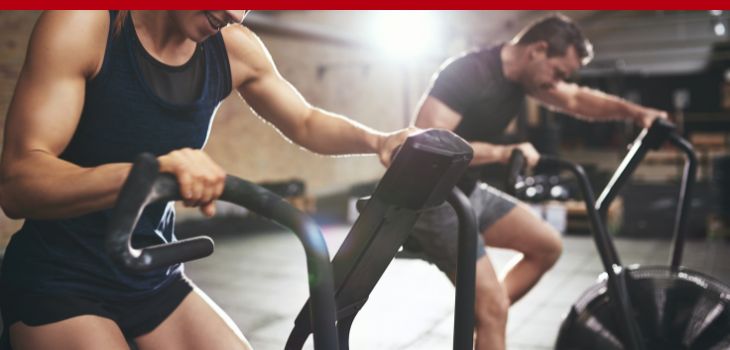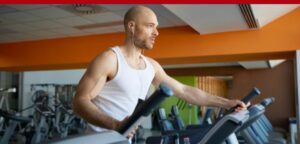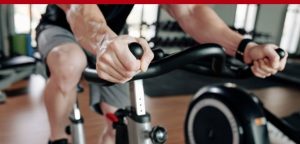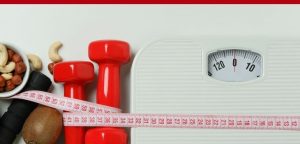If you’ve ever tried to shed some extra weight and get fit, you’ve probably wondered about the role of cardio in your plan.
Navigating through all the fitness advice and opinions out there can be a real head-scratcher, and it’s not always clear whether cardio is your reliable ally in the quest for fat loss or a potential threat to your muscle gains.
In today’s episode Ted is going to take a deep dive into this topic. He’ll share some science, throw in his own experiences, and share a couple of client case studies. He will reveal some surprising insights that might go against what you’ve heard before.
He will also talk about the most important type of training you need to follow in your fitness journey, the importance of regular body fat testing for accurate progress tracking, how cardio can serve as a tool to manage stress and negative emotions and more. Listen now!
You’ll learn:
- The most important type of training you need to follow in your fitness journey
- The importance of regular body fat testing for accurate progress tracking
- Different factors that can influence the impact of cardio on muscle preservation
- The potential role of cardio in physique competitions and achieving extreme leanness
- Practical tips to help you tailor your fitness program to your unique needs
- Insights into the emotional and psychological aspects of fat loss
- How cardio can serve as a tool to manage stress and negative emotions
- And much more…
Related Episodes:
Ted Talk 173: Why Are Weights Better For Fat Loss Than Cardio? – Ask Ted
500: Zone 2 Heart Rate Training: Cardio Exercise for Longevity and Performance with Ted Ryce
Ted Talk 120: Is Cardio Really the Secret to Fat Loss? – Ask Ted
Links Mentioned:
Sign up for my Unstoppable After 40 Newsletter
Watch My FREE Body Breakthrough Masterclass
Want some help building your best body ever?
Here are 3 ways I can assist whenever you’re ready.
1) Sign up for my Unstoppable After 40 Newsletter and get an email every Friday with tips and strategies on how to transform your body and reclaim your health in record time.
2) Want to learn the simple 5-step process my high achieving clients over 40 are using to skyrocket their energy and build younger, leaner bodies while enjoying life?
Watch my brand new Unstoppable After 40 Masterclass.
3) Work with my team and me directly to reclaim your health, lose fat, and get into the best shape of your life in 2023.
Marvel at the testimonials here first, then schedule your call.
Podcast Transcription: Zone 2 Cardio For Fat Loss: Beneficial Strategy Or Bad Idea?
Ted Ryce: Today we're going to be delving into a topic many of us wonder about when we're trying to lose fat. Should we or should we not use cardio?
And if you've ever wondered the answer to that question, well, I'm going to do a deep dive into it. Not only am I going to share some of the science, but I'm going to share my own personal experience. In fact, I'm going to share a couple of case studies from working with clients, and some of what you might hear in those case studies goes against what people say, even some of what I've said. So, without further ado, let's just hop right into it.
And this question comes to us from a listener. His name's Steve, and he's lost 60 pounds in part from listening to my podcast. And when he told me that, and by the way, shout out to you, Steve, really appreciate you sharing that the podcast made a difference for you.
And when I asked him, well, what specifically helped. He said, “I'm definitely in your target, target demographic, middle-aged dudes. So, I naturally resonate with your message.
But more specifically, you cut through a lot of the hype and deliver some tough love about taking responsibility for your own health and fitness. Then he goes on to say, you have left unsolved one important issue where you've presented contradictory comments, namely if Zone 2 cardio is beneficial or contraindicated during a fat loss regime where retention and growth of lean muscle mass is desired.
Alone, it may not stop muscle loss, but in conjunction with resistance training, it should be beneficial overall, correct? It's actually a minor issue, but I have been mentally tracking your comments on the topic. Actually, it was raised by one of your guests that raised a contrary position, but you didn't object.”
Great, great question. Do you hear the nuance there? So, here's what I have to say about it.
Number one, let's talk about the importance of resistance training. And what I want to tell you is this: the research consistently shows resistance training, whether that's lifting weights or using bodyweight exercises, kettlebells, because I don't want you to get caught up with the tools.
So many people get caught up with the tools. "Oh, but I'm using kettlebells." Is that, yes. If you're lifting, let's say, in between five and 30 reps, and you're taking each set close to failure, and you're doing that on a consistent basis, it doesn't matter if you're using bags of sand or concrete blocks or it doesn't matter.
Now, you know, I should say, just for intellectual honesty here, sure, there are some nuances, so it does matter, but I'm not going to open up that can of worms. In general, it doesn't matter as much as you think. There are some nuances, but if you're doing resistance training, it's the most effective strategy for fat loss. So, let's talk a little bit about cardio and muscle loss.
And what I want to tell you is, there's quite a few studies on this, and I'm not going to name any studies. I didn't prepare in that way for this episode because I'm going to share some case studies from my own coaching business that I think are going to help you more than me talking about the research and getting into the numbers.
I love the research, and I love the numbers. And I think it's really important anyone who you listen to is into the research, not just the research that confirms their own bias, but also the research that goes against what their biases as well.
So, what I want to tell you is this, there's some data showing that when individuals perform cardio alone or mix their workouts with cardio and resistance training, there tends to be an increased loss of muscle mass.
And there are several studies that show this. I'm not going to cite them, but if you, well, you know what, I've done it on other episodes. I just don't want to get into it, to be honest, because I don't think it's going to be super important. I'm going to share, in other words, I'm going to share something that I think is way more practical and way more important for you than talking about the research.
But I also want to say, I've also seen research studies were engaging solely in cardio didn't result in any muscle loss at all. In fact, I'm thinking of one study, it was on twins, and the guy didn't lose, one did lifting, the other did cardio, and neither one lost muscle. The cardio twin didn't lose any muscle.
So why the variability in research? And what I want to tell you is this, different strategies can yield different outcomes depending on the individual. Some of us have different genetics.
Also, if you're obese, let's say with 30% body fat versus a leaner individual with 18% body fat. That's going to be a different situation. Also, how long have you been lifting? Are you someone who, yeah, you're obese at 30% body fat, but you've been in the gym lifting for years versus someone who's obese and they've been on the couch for years and now they're just starting to train.
Just to give the short answer there, if you ask me, well, what's that going to do? The person who isn't trained, probably going to, they may even build muscle from doing cardio because they went from zero to something. But if you're highly trained and you have quite a bit of muscle mass, you might risk some body, some muscle loss. Or let's just say the higher risk is there.
Also, the leaner you are, generally speaking, the higher likelihood of losing some muscle mass when dieting. So, keep that in mind. That said, I want to share with you a couple of case studies here.
And what I want to tell you, and I want you to listen to me because I feel like I say this over and over and over again to people, but they never take action on it, and that's okay, no problem. But I, and I say this not to give you a hard time, but to reemphasize how important this is, get your body fat tested. Let's not talk theoretically. And this is exactly what I do with my clients and my coaching program.
Get a body fat test. I like Dexa scans and InBody scans. You can do hydrostatic weighing. Avoid the caliper testing. Not going to go into too much detail there, but I did caliper tests. I have the good calipers, the $500 calipers, and I used to test clients all the time.
And I was trained to do it, and I think it takes someone who is an expert to get that right. But your bro, or broette trainer in the gym who's just doing it every once in a while, because they don't even work with that many clients, that was my case, by the way, and you do it every once in a while, they're not that good with them. So, I really like using technology here. Get a body fat test.
This way, we don't need to talk about what the research says. I mean, it's important to know, in general, you want to skew your training, and I'll talk about a different, I'll talk about when I do something different here, but in general, you want to skew your training to lifting weights, okay? Resistance training. And I went over, it doesn't matter if you're doing dumbbells or barbells or whatever, but you're doing resistance training of some sort.
This way, we can accurately track progress. And I want to talk to you about two clients that go against what I just said. The leaner you are, the higher likelihood of losing some muscle mass when dieting.
I had one client, Trevor, shout out to you, Trevor, if you're listening, he crushed it in my program. In two months, the guy did a very, he went from 17 and a half percent body fat to believe it was 12 and a half percent body fat or something like that.
And in other words, he lost 20 pounds, took 20 pounds, and it was 20 pounds of fat loss. How do I know that? We got a DEXA scan. And he not only lifted weights, but he also did cardio.
And he didn't lose any muscle at all. It was actually he did. It was 0.1 pounds of muscle, 0.1 pound of muscle. So, 1/10th of a pound of muscle.
And then I have another client who she has been meticulously following a resistance-focused workout that I created for her. And we just had her second body fat or second DEXA scan done, and she lost muscle.
And she's been doing everything right. I mean, there's just some, and Trevor had a higher, I'm sorry, a lower body fat percentage. He was more, theoretically speaking, at risk of losing muscle mass than this other client who I'm talking about. But she ended up losing a little bit of muscle.
So sometimes real life, there's just too many things going on. Why is that? Did Trevor sleep better and my other client didn't? I don't know. We're not crunching all the data, and there's so many things, higher stress, sleep. There are so many things that can play into this. And so instead of trying to theoretically put all the pieces of the puzzle together, just do a DEXA scan.
And I want to give an example for my client who was doing everything right. What we do is like, okay, well, what can we do better here?
And that's what I've been working with her on. I also want to say this when someone is in a situation where they're overweight or obese and they have a bit of fat to lose and they're doing a solid job in general, maybe they're not. I never expect anyone to be a hundred percent perfect, but I expect people to follow to the best of their ability the plan. Knowing that they're never going to hit a hundred percent, but they might get 80, 85, 90.
She's a rock star. She crushed it with following the program, but she lost some muscle. I just got that information, and now we're going to look into well, how can we take it to the next level and adjust things so that she makes sure that she doesn't lose additional muscle. But I will say this one other thing when you're doing this, don't just get an InBody or DEXA scan and then just forget about it. You want to do them quarterly, every three months.
And if it's an InBody scan and you, because those are usually less expensive and more accessible, do them even more frequently. However, you can't just use your scale.
And I want to say one more thing here. There's another crucial dimension to this.
Some clients join my program, and they're under high stress, or they're struggling with their mood a bit. In other words, negative feelings. So not exactly full-blown depression, but perhaps subclinical depressive moods or anxiety.
And again, I'm not diagnosing. I'm just getting information from them. I don't diagnose or treat any medical situation, but I listen to my clients. If they say, "Hey, listen, feeling this or experiencing these moods."
And in those cases, I want to tell you, I lean on cardio more, not just for its physical benefits, but also for its emotional and psychological boosts. Because the truth about fat loss is that it's stressful to your body. It's stressful to your body because you're a couple of reasons.
Number one, cutting down on calories, it can create some hunger and you try to deal with that hunger, that can be stressful. Number two, you're learning new skills. It's stressful to learn some new skills. People come to me because they're not getting the results they want. So, part of what they need to do to level up is to not just get some new knowledge but also learn some new skills. That can be stressful.
Not in a bad way, but it creates some stress.
The third thing I think is really important too is that a lot of folks are using food and/or alcohol to self-medicate negative emotions. And so, when they're doing a fat loss diet, it's like, okay, I'm not going to drink, and I'm not going to eat the pie, the cake, the donuts, the pizza, the pasta, whatever I've been using to medicate my feelings. And so, you're taking away a coping mechanism. That's stressful too.
And sometimes it's all three. So, in situations where a client tells me, "Hey, you know, I'm struggling a bit here." I'll lean on cardio.
And even if there's some muscle loss, I accept it because I know I can rebuild it later.
So, it's not the worst thing in the world to lose muscle, although I will say, it is a bit of a red flag for weight regain. As I've talked about in my episode with Bill Campbell, and I've talked about many times before that, there's something called the fat overshoot.
And the fat overshoot is what scientists are hypothesizing happens to people when they go on a diet and lose too much muscle. And that idea with the fat overshoot is that when you go on a diet to lose some fat and let's say you end up losing a bunch of muscle in the process, what happens when you get your ideal weight, let's say, let's say you hit your goal weight, what happens is, your body starts to increase your hunger levels until you eat enough to get that lost muscle back.
And as that happens, not only do you get the lost muscle back but you get the lost fat back as well. If you're not paying attention and you're just hungry and then you're just eating.
So, that's something I know about, and I pay attention to. But short term, if someone's struggling emotionally and they're even having a hard time losing fat, not because they don't understand calories, but they find themselves emotionally eating, or they're not able to, let's say, track their calories accurately because they're just missing it because they're under so much stress or whatever the case may be, I'll lean on cardio, and I don't mind doing it, even if there's a little bit of muscle loss.
However, as soon as a client tells me they feel better, we start shifting over back to strength training. And so, I know that's a lot that I just shared.
And I also know that it's not the most simple answer. Because I gave you a lot, or at least I don't think it is, because I gave you a lot of information and a lot of different contexts where what you think might happen might not actually happen.
But if you take one thing away from this, or if you take a framework away from this, number one, if you're going to try to lose fat, get a body fat test done. Because not only will that tell you your body fat percentage, it'll tell you when you lose weight, it'll tell you how much of that weight was fat and how much of it was muscle. And if you see that you're losing equal amounts 50/50, you're going to need to keep in your mind, okay, this is a recipe for failure, I'm going to have to change something.
So that's the number one takeaway, make sure you skew your training towards resistance training. If you don't do that, you're really asking for regaining the weight.
Now, if you want the third thing is if you want to add cardio, do it but be specific about why you want to add it. There's a couple of reasons that I think are important. Number one is what I've talked about before. It helps you with mental wellbeing.
The second part though is that it also helps if you know anything about physique competitions, some people, some of these competitors, they rely on cardio to get as lean as possible.
They probably lose some muscle in the process, pretty sure they do. Some of them, I knew one bodybuilder, she would do two 45-minute sessions of cardio. , She was on steroids, a lot of steroids actually, but she would do for 45 minute sessions of cardio.
So, physique competitors rely on cardio. Cardio can be a nice boost to fat loss. Just make sure you're focused on lifting; you're getting enough protein in, but you can add cardio. If one, it helps you feel better, or two, you're looking for a little bit of a boost with fat loss.
And that's all there is to it. Be on top of your numbers. Make sure you track your results, and you're going to be fine.
And if there's just one key takeaway, it's that track your results. Track, track, track. That's how I get such great results. If you've ever wondered how does Ted get these people into such great shape?
How do they lose 56 pounds or 20 pounds or 30 pounds? We use data. I'm not doing anything magic. Well, you know, maybe the way I put together my program gets results that seem magical, but it's not magic. I'm just relying on data, and I'm not relying on feelings, and I'm not relying on even the research and what the research says.
Well, I do rely on it in terms of a foundation to make decisions from, but I don't care about what happened in a study. I care about what's happening with my client. What does the DEXA or InBody scan say?
And what do we need to do to change things to either maintain the results we're getting right now or to adjust to get better results? And if you do that, you can't go wrong. Takes some time to figure that out, you know, to know what to do with the data. That's why people work with me. But just like, just like Steve, the person who asked this great question, he lost 60 pounds in part using information he got from this show. So, you can do it. You don't have to work with me.
I'll make the process easier for you, but it's doable on your own. Just be data-driven, track and test, just like you would with your business, just like you would with your budget.
And if you do that, you're going to get great results.
So, thank you for joining me today on Ask Ted. And I want to ask you, what did you learn today that you can take into your program and start doing tomorrow?
That's what I want to leave you with. And remember, everyone's journey is unique. Listen to your body, understand your emotions, tailor your training accordingly, and most importantly, track your results. And if this episode resonated with you, or you think it might help someone you know, please share it with them.
So, until next time, stay legendary.
Sign up to receive email updates
Enter your name and email address below and I'll send you periodic updates about the podcast.









